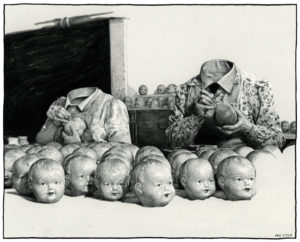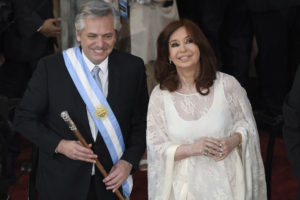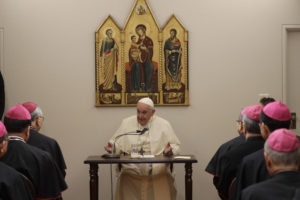Argentina’s Milei Guts Public Media
The shutdown of a state-owned media agency threatens the right to information. A demonstrator holds on to a giant doll depicting Argentina's President Javier Milei during a protest in Buenos Aires, Argentina, Friday, April 5, 2024. (AP Photo/Natacha Pisarenko)
A demonstrator holds on to a giant doll depicting Argentina's President Javier Milei during a protest in Buenos Aires, Argentina, Friday, April 5, 2024. (AP Photo/Natacha Pisarenko)
Argentine president Javier Milei announced the closure of the national news agency, Télam, in his State of the Nation address on March 1. “We are going to close the Télam agency, which has been used during the last decades as a Kirchnerist propaganda agency,” said Milei. The previous presidents, Néstor and Cristina Kirchner, were only in power for 16 years, while the state-owned company has been in existence for 79 years.
Two days later, the intervenor of the public media system, Diego Chaher, issued an order to fence off access to the agency’s two headquarters, setting up permanent police surveillance to prevent personnel from entering. That same night he sent an email to workers informing them that they were “released” from their obligation to work for one week, while still receiving their salaries. Access to the agency’s subscriber news services and public access website was also canceled. The situation remains unchanged and there is no official information on the future of the company. With the absence of Télam, the only body producing decentralized news content throughout the nation disappears.
Ever since the government canceled all activity, Télam workers have camped out in front of the offices in the city of Buenos Aires. They take turns day and night, making sure that no equipment is removed and no facilities are destroyed. Nicolás Luna, a representative of the workers, pointed out that Milei had declared Télam his enemy after the failure of the Omnibus Law. “This is a decision that not only we are suffering, because it is happening throughout the State, where tens of thousands of workers are being dismissed,” said Luna.
The Implications of Media Concentration for Democracy
According to Martín García, former president of the agency between 2010 and 2012, Télam disseminated news and expert opinions from all provinces in multiple formats to both national and international media. García said, “Télam is the only media that covers the whole country with journalists who see, are informed and analyze what is happening in each place.” Télam produced and distributed nationwide information in an equitable manner. Both large commercial media outlets and small provincial, community, and university outlets had access to Télam’s coverage. Until its closure, 2,800 radio stations in small towns had access every hour to the national news panorama produced by Télam, which they could use free of charge.
In the two months since Télam’s shutdown, rumors have increased about the closure or privatization of other public media. These other outlets include Televisión Pública Argentina, Radio Nacional, the educational channels Encuentro and Paka Paka, and the sports channel DeporTv, all of which belong to the state-owned company Contenidos Públicos.
With the absence of Télam, the only body producing decentralized news content throughout the nation disappears.
“Without public media, there is no democratic or pluralistic communication. In Argentina we are heading towards unprecedented media concentration”, said Rosaura Audi, former Undersecretary of Public Media. During the last fifteen years of discussion about Argentine media, the danger of concentration has become evident, since the owners are allowed to own the means of information transmission, home Internet and cable TV services, mobile telephone services, and simultaneously they are the producers of television, radio, and graphic media content. Modern legislation prevents cross-ownership of these services. In light of this, state-owned media counterbalances the power of the large economic media groups. This concentration affects the plurality of content and the diversity of news circulating about Argentina in the rest of the world. The growing concentration of the media in Argentina, mostly aligned with right-wing ideas, constitutes a limit to the democratization of society, which needs a multiplicity of points of view and a plurality of voices.
“Since this administration took office, we knew that it would go after everything state-run, and in particular, the public media,” says Agustín Lecchi, general secretary of the Press Union of Buenos Aires (SIPREBA) and a public television worker. Milei has been threatening public media since his campaign, “but that doesn’t mean that he will be able to implement what he says he is going to do,” said Lecchi. Although there is an important history of frustrated attempts to shut down public media, particularly during dictatorships, Milei’s decree enables the intervention of public media without appointing the collegiate board of directors that corresponds by law. This measure opens the door to modify their objectives, dispose of their tangible and intangible assets, sell all or part of the companies or order their definitive closure. Before the decree, these operations required the approval of the National Congress.
Un “vaciamiento de la pantalla”
Télam is the largest state-owned news agency in Latin America, with 803 clients in Argentina and 45 abroad, with subscriptions in its five service units: text, photography, video, audio and infographics. According to a report issued by the workers after the suspension, the agency produced per month around 12,000 cables; 6,000 photos; 800 bulletins; 70 infographics; 150 audios and 400 videos. Monthly, over 63,000 users interacted with subscription-based services, while nearly 9 million people visited the web site.
“In addition to breaking news, plurality and archive material available for consultation was lost.”
Since Télam’s services have been suspended, media outlets throughout Argentina have been impacted. Irina Sternik, a journalist specializing in technology and media, gathered testimonies from colleagues all over the country for her newsletter Lado B news. She detailed the responses she received: “The testimonies are shocking. In addition to breaking news, plurality and archive material available for consultation was lost.” As a journalist of Televisión Pública Argentina, Sternik shared her relationship with Télam’s work. “I usually surf Télam’s website and I notice the difference in quality between the agency’s coverage and the other media, which in general copy their cables. They are verified articles, enriched with perspective and full of data.” (From the first conversation we had on the subject up to the present, the public television station has not renewed Sternik’s contract).
Télam’s paralysis is an indication of encroachment on different public outlets. At the national television station, all production was canceled, except for two news programs on weekdays. In the rest of the weekday time slots and during weekends, they broadcast recorded programs and old movies. Currently, from midnight until dawn, the channel permanently broadcasts a still image taken from a public camera that focuses on the obelisk of Buenos Aires. This has never happened in the history of the television channel. “We are undergoing brutal downsizing that affects us economically, but above all this is a vaciamiento de la pantalla (hollowing out of the screen),” said Lecchi. This “hollowing out of the screen” infringes upon the right to information in Argentina, especially for those who rely on the channel as an easily accessible news outlet. At the same time, it facilitates the consolidation of a hegemonic model of information production that favors the current, right wing administration.
The Right to Information at Risk
The cuts to workers and programming are also part of the decisions of Radio Nacional Argentina’s management, led by Héctor Cavallero, a retired show producer who has no previous experience in radio broadcasting. “Since this government took office there has been a drastic reduction of personnel, most of them workers from the provinces,” said Fernando Piana, journalist and delegate of the Association of State Workers at the radio station.
“In December they laid off 160 workers who on average were paid less than 100 US dollars a month, and in the last few weeks 90 people were laid off. They represent almost 20 percent of the total workforce,” added Piana. Radio Nacional Argentina has radio stations in about 50 locations in the country, including the Antarctic territory. The current management decided that all of them will stop broadcasting their own programs during prime time and will have to broadcast only content produced in Buenos Aires. The production of each location is now relegated to non-prime time slots. Programming will be dedicated to entertainment or local news packages that do not contradict the agenda produced by the central management, whose main goal is to neither contradict nor criticize the proposals of the national government.
No public media authority has mentioned restrictions on content, however there are topics being silenced and journalists are under pressure. The decision to cancel weekend news broadcasts on public television was made precisely on the eve of March 24, the day on which the beginning of the bloodiest dictatorship in Argentina’s history is remembered. For the first time in 40 years, the station did not broadcast the 24M march, attended by hundreds of thousands of people throughout the country. Similarly, Televisión Pública was the only national channel that did not broadcast the mobilization in defense of public education held on April 23. Hundreds of thousands of Argentines took to the streets in the city of Buenos Aires and at least twenty other cities across the country, calling for more university funding and protesting against Milei’s proposed austerity measures.
“The Media Secretary asks us not to use radio stations and/or their networks to show solidarity with Télam. Only use official information.”
In the case of Radio Nacional, a message was sent to the directors of all the localities regarding Télam’s closure. The message, which was circulated through informal messaging, said: “Important. The Media Secretary asks us not to use radio stations and/or their networks to show solidarity with Télam. Only use official information.” Across media outlets, workers agree that the pressure exerted has opened the door to self-censorship.
Furthermore, there are rumors of possible business deals based on the sale of real estate. There are many speculations on this matter, since there are many properties highly coveted for their real estate value (the headquarters of Televisión Pública, the plot of land where the transmitting station of Radio Nacional Buenos Aires is located, the headquarters of the same radio station in the tourist city of San Martín de los Andes or in the city of Esquel). However, for the time being, none of these transactions may be carried out without the authorization of the Congress or without having modified the ownership of the media.
These public outlets are not only dedicated to producing news material. They also have teams dedicated to retrieving and cataloging archival materials of great historical value for researchers, press workers, and the general public. In 2013, the Archivo de Radio y Televisión Pública (Public Radio and Television Archive, RTA) was created for Televisión Pública and Radio Nacional. Its goal is to “organize, preserve, digitize and make audiovisual and sound material available to the public.” This work was discontinued during the administration of former conservative President Mauricio Macri (2015-2019). It suffers the same fate during this current period.
Télam, on the other hand, administers, organizes and shares an archive of news wires and an invaluable repository of photographs, such as the only ones taken during the war over the Malvinas Islands by Argentine photographers. In 2015, Télam began a process of recovery, restoration, digitization, and cataloging of photographs and negatives existing since 1972. By December 2023, nearly 3.5 million images had been digitized. This process was carried out by the agency’s employees.
For Martín García, Télam and the public media system “is the organized memory of the country.” Today this material is inaccessible and, consequently, this collective memory runs the risk of being erased forever.
Your support matters…Independent journalism is under threat and overshadowed by heavily funded mainstream media.
You can help level the playing field. Become a member.
Your tax-deductible contribution keeps us digging beneath the headlines to give you thought-provoking, investigative reporting and analysis that unearths what's really happening- without compromise.
Give today to support our courageous, independent journalists.






You need to be a supporter to comment.
There are currently no responses to this article.
Be the first to respond.